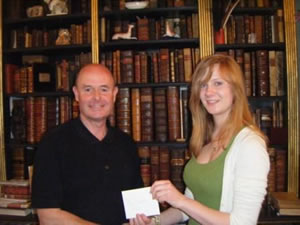Top prize goes to Lucy Byford for her review of Jane Austen's Northanger Abbey
16-year-old Lucy Byford has been named as the winner of the Festival Book Review Competition at the first Chiswick Book Festival. She wins a £20 book card, donated by Waterstone's, presented by Festival director Torin Douglas (pictured right).
Lucy's review of Jane Austen's Northanger Abbey (see below) was described by the judges as "good for anyone and outstanding for a 16-year-old." Lucy is studying for her GCSE exams at St Paul’s Girls’ School and her favourite author is Charlotte Bronte.
The competition judges were: Celia Brayfield, author and reader in creative writing at Brunel University; and Richard Broke, television drama producer.
Torin Douglas, director of the Chiswick Book Festival, said: "Congratulations to Lucy. It's a great achievement, particularly when the competition was open to all ages.
“I’d like thank our two distinguished judges, who engaged in a heated discussion before coming to their unanimous decision. And thanks to those who entered and obviously enjoyed the intellectual challenge of writing a witty review in 300 words."
Celia Brayfield said of Lucy's review: "This is a very well-balanced and well-written piece, showing a good grasp of the book, its context and of some aspects of literary criticism."
Richard Broke added: "The plot synopsis was well integrated with comment and personal opinion."
‘Northanger Abbey’, Jane Austen by Lucy Byford, age 16
At the heart of any appreciation of this, Austen’s first book for publication, is the reader’s experience of Catherine Morland, its heroine. Catherine embodies orthodox traits of a young lady in Austen’s novels: pleasant, eloquent yet quiet with passably pretty features. Like many seemingly well-bred girls of the time, Catherine Morland is taken over by the mainstream addiction for Gothic novels such as The Mysteries of Udolpho, and consequently her dreams are shaped into reveries of abduction to haunted abbeys by seductive madmen.
Miss Morland, during a life-changing trip revealing Bath’s excitements, meets another Gothic fanatic, Isabella Thorpe, with whom she develops an intimate but eventually meaningless friendship. Isabella encourages Catherine’s love for such books, letting it thrive off the Radcliffe works she recommends. When Catherine meets Mr Tilney, an unmistakable spark forms between the two, but despite the increasing wit he supplies in conversation, the majority goes completely over her head. Nevertheless, Miss Morland is a hit with the Tilneys and eventually she is invited to stay with them at Northanger Abbey. This opportunity is leapt at by Catherine, envisaging the awakening of her wildest gothic dreams, only to discover through a series of anticlimaxes that the Abbey is just as ordinary as elsewhere.
This novel was a rare wake-up call for girls of the period and importantly shows how they supplemented reality with fantasies. Fortunately women’s opportunities have now changed radically. As always, Austen’s language is exquisite and its quirks and sarcasms induce a smile or two, but I would gently suggest to all potential readers that their time may be better spent doing something other than occupying Catherine Morland’s head. Despite her rapid maturing throughout this Bildungsroman, the ending goes by and still that head is largely empty.
October 13, 2009
